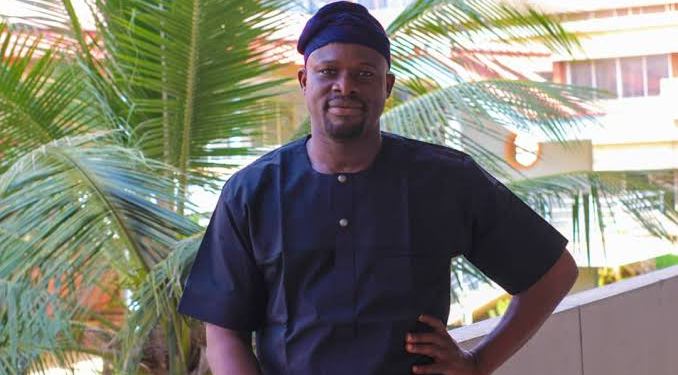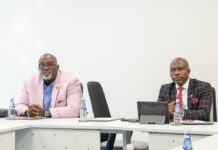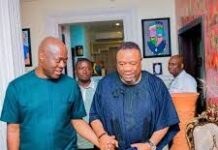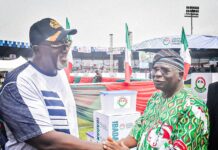OBI-BATism is a movement by Nigerian voters and non-voters for the actualization of return of political power to the southern part of the country after the North would have finished their eight-year hold on power under the outgoing President, Muhammadu Buhari. OBI-BATism animates this concern before political parties elected their flagbearers in the interest of peace, justice, equity, and national development. While the All Progressives Congress (APC) settled for Bola Ahmed Tinubu, the main opposition party, Peoples Democratic Party (PDP) refused to vote for a southern Nigeria flagbearer. PDP dared to put forward a perpetual contestant, Atiku Abubakar. This balkanized the party, forcing the pull-out of five governors code-named “G5” (Nyesom Wike, Rivers; Samuel Ortom, Benue; Ifeanyi Uguwanyi, Enugu; Okezie Ikpeazu, Abia and Seyi Makinde of Oyo state). These governors claimed to represent a movement fighting for equity, justice and fairness. Obviously, they were against the emergence of another northerner as President of Nigeria. All entreaties to them failed, they became a political ‘cult’ group, ready to negotiate with interests that align with their convictions. Not ready to be commandeered, Peter Obi, the new face which changed the dynamics of the 2023 presidential election, defected from the PDP into the Labour Party and secured the presidential ticket. In the same way, Rabiu Kwakwanso, former PDP member also clinched the ticket of New Nigeria Peoples Party (NNPP). A four-horse-race contest then began between the forces that wanted political power at the center to remain in the North (Atiku Abubakar and Rabiu Kwakwanso) and the forces that desire political power to move down south (Bola Ahmed Tinubu and Peter Obi). These formations set the tone for a new political dynamic which rocked the 2023 elections and the eventual winner as announced by Mahmood Yakubu, the Chairman of the Independent National Electoral Commission (INEC) in the early hours of March 1, 2023.
The new month of March opened with the declaration of Bola Ahmed Tinubu (BAT) of the APC as the president-elect. The ‘kingmaker’ who has now become president-elect defeated his long-time rival and political associate, Atiku Abubakar and the third force, Peter Obi to the second and third positions respectively. Bola Tinubu who promised renewed hope polled 8,794,726 while Atiku Abubakar who promised to unify the country polled 6, 984, 520 which is 1,810,206 below the votes of the winner. The political game changer, Peter Obi who promised to move the nation from consumption to production gave the two establishment forces a battle for their money, returning with 6,101,533 votes. Rabiu Kwakwanso was only able to finish with 1, 496, 687 votes; the largest part of this came from Kano, the only state he won decimating other political parties.
While the results may have been announced, some felt the process was not entirely credible. They are unhappy about the manner the polls were conducted by INEC such as delayed uploading of results, delayed arrival of INEC staff, voter suppression and intimidation, collaborative electoral fraud, violence, and disenfranchisement of Nigerians. This perception has generated cold war and hate speeches on many social media platforms. Although he finished third, many didn’t believe that Peter Obi did not win. They believe that there are underhand dealings or electoral malpractices. Friends, associates and family attacked one another based on political differences. The sociology of voter behaviours and preferences as exemplified in the 2023 presidential election tells me that Nigerians desire a country where peace, progress and prosperity are assured but differ on the right pilot to take the country to that destination. The main contention was and is still between the supporters of the president-elect, Bola Tinubu and those of the labour party candidate, Peter Obi. Old men fought themselves dirty, the youth felt disappointed with the outcome. They reasoned that the process was compromised. The Asiwaju people would not tolerate anyone to talk down on the man they think hold the magic wand to their futures.
The presidential results however tell me a lot of stories. One, a total of 14, 896,259 (Tinubu + Obi votes) voted for a southern presidency while a total number of 8,481, 207 (Atiku + Kwakwanso votes) voted for northern presidency. The difference of 6, 415,052 voted for equity, justice, inclusive governance, peace and unification of the country which may have been threatened if the opposite happened. Two, the total number of people who voted against the president-elect are 14, 582, 740 indicating that there is possibility that the president-elect’s chances may have been threatened were it not for the Obi phenomenon and the G5’s disruptive political move in the PDP. What this says is that the president-elect will need to understand the dynamic needs of these people and incorporate their aspirations in his blue-print of governance.
People think it is backward to vote along tribal lines even when you believe your ethnic group has the best of the candidates. Such thoughts, as good as it may seem, downplays the social reality embedded in the sociology of electoral victory in Nigeria. The law stipulates winning majority votes and getting 25percent in two-thirds of all the states and FCT. This implies is that you must have a strong base, secure it and reach out to political allies in zones with higher voting population for partnership. This is where the constitution lays foundation for voting along ethnic lines. Bola Tinubu edged others out in these areas because all three top candidates won 12 states each while the fourth won one. What separated them was the highest votes he secured and the 25percent spread. Tinubu secured his southwest and where he lost, it was with narrow margin or not without getting 25percent votes. Obi secured his base but his gains outside his base were not with high margins as with the first two candidates according to the results released by INEC. Tinubu reached out to the G5 who added to his gains. This should tell Nigerians that politicians, unlike them fighting themselves, don’t have permanent enemies. They go after those who can guarantee their interests and futures. Nyesom Wike’s posture aptly captured this point.
INEC, with all the logistics support ought not to have allowed suspicion at all let alone asking people to go to court if they have any issue with the results. A maxim in Yoruba says If God sees you, let humans see you too (ti olorun ba ri e, je ki eniyan naa ri e). Transparency has tracking variables. An electoral umpire should be transparent and follow due process as laid out. When people perceive injustices in the electoral process, they will protest and it may cause legitimacy crisis. Peace is possible when people experience justice. Obviously, we didn’t learn from how Kenya conducted her elections.
We need to do better in the coming gubernatorial and state assembly elections. It is sad that those who turned out to cast their votes during the presidential and National assembly polls were less (about 24million) than that of 2019 general elections where 28,614,190 voted. Apathy is growing and the way election process and outcomes are perceived may contribute to this. It is a loss of scarce resources to plan for at least 50 million voters only for less than 25million to show up on election day. We must appeal to people and act for people to believe in our election management system.
Moving forward, the 2023 presidential election teaches the establishment some lessons about over-hyping and overrating themselves. Peter Obi who was said to have no structures won 12 states just like the PDP and APC who boasted of structures. The 6.1 million Nigerians who voted Peter Obi showed that the people are the pillars of support and structures needed once your plan captures their needs and aspirations and represent the future they desire. Obi and his supporters have proven that they exist in real life and not only on social media. Leaders should begin to tap into the unmet needs of their people so as to be able to develop policies that will be impactful. OBI-BATism is a lesson in democracy and a beneficial springboard for the kingmaker to become the king.
Dr. Tade, a sociologist wrote via dotad2003@yahoo.com






